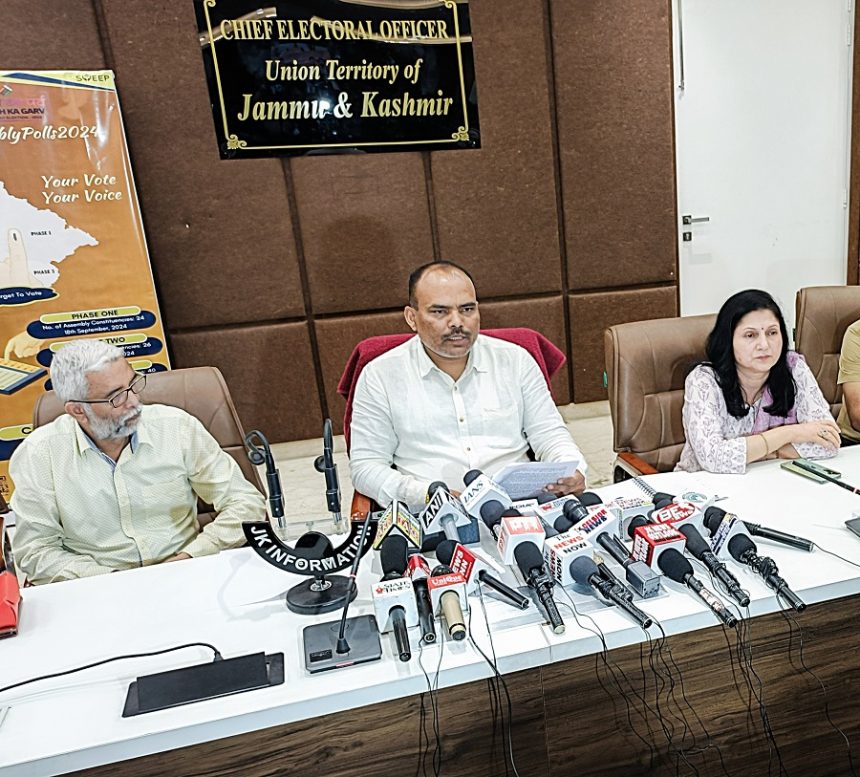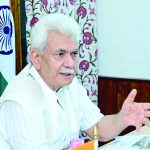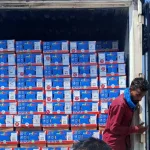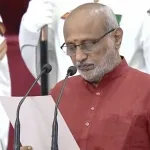Kishtwar records highest 77%, Pulwama lowest at 44%
Chenab valley voters show much enthusiasm
Polling across 24 constituencies in 7 dists incident-free & peaceful
Women, youth, PwDs & elderly participate in good numbers
ECI seizes ₹124 Cr ahead of Phase 1, targets clean & fair polls
JAMMU, Sept 18: The first phase of Jammu & Kashmir Assembly elections recorded a voter turnout of approximately 59%, according to Chief Electoral Officer (CEO) PK Pole on Wednesday. Kishtwar district led with the highest turnout at 77%, while Pulwama reported the lowest at 44%. The turnout is provisional, with final figures expected to increase as polling data continues to be compiled, especially from remote areas.
Addressing a press conference in Jammu, Pole expressed satisfaction with the polling process, highlighting the significant enthusiasm in the Chenab Valley, where Doda and Ramban districts recorded the second and third highest turnouts. “This is the highest voter turnout in South Kashmir in the last seven elections,” Pole remarked, noting that participation is likely to rise in the next phases of the election.
A total of 3,276 polling stations were set up across Jammu & Kashmir, including 24 special polling stations for Kashmiri Pandits, located in Jammu (19), Udhampur (1), and Delhi (4). Voter participation was observed to exceed the levels seen in the 2024 Lok Sabha elections, which had recorded a 58.58% turnout—the highest in 35 years.
Meanwhile, Chief Election Commissioner (CEC) Rajiv Kumar, overseeing the election process with Election Commissioners Gyanesh Kumar and Dr. Sukhbir Singh Sandhu, lauded the voters for their participation. “The people of Jammu & Kashmir have responded to the call of democracy, standing firm against forces attempting to disrupt the electoral process,” said Kumar.
The ECI emphasized its commitment to ensuring peaceful and fair elections, deploying 32 Central Observers and webcasting from all polling stations. The deployment ensured a vigilant watch over proceedings, preventing any malpractices.
The enthusiasm of young and female voters was a standout feature of the day. Many elderly citizens and Persons with Disabilities (PwDs) also cast their votes, with those aged over 85 and those with 40% benchmark disabilities given the option of voting from home. Assured Minimum Facilities (AMF) such as ramps, wheelchairs, drinking water, and volunteers were available at polling stations to ensure convenience for all voters.
Long queues of voters were reported across the seven districts—Pulwama, Shopian, Kulgam, Kishtwar, Anantnag, Ramban, and Doda—indicating widespread engagement. The enthusiasm of voters, particularly women and youth, was palpable. In a significant gesture of inclusivity, special facilities were provided for the elderly and persons with disabilities (PwDs).
One polling station in each Assembly constituency was exclusively managed by women and PwDs, offering a welcoming environment for all voters. In Dhadkai village of Doda, a “Silent Village” known for its residents with hearing and speech impairments, voters cast their ballots, with three sisters showcasing their inked fingers after voting—an inspiring example of inclusion and participation.
The Election Commission took firm action against electoral malpractices, with technology-driven interventions and close monitoring resulting in the seizure of ₹124.3 crore worth of illicit items. The most significant component of these seizures was drugs and narcotics, amounting to ₹107.9 crore, highlighting the Commission’s commitment to curbing the use of illegal means to influence the electoral process. Over ₹15 crore in freebies meant to sway voters were also confiscated. This reflects the Commission’s strict stance on maintaining clean elections, further reinforced by a 98.3% disposal rate of complaints filed through the cVIGIL app against electoral malpractices.
The Election Commission also provided candidates and political parties with a transparent and efficient process for requesting permissions through the Suvidha platform. Over 4,458 requests for rallies, public meetings, and campaign materials were approved ahead of the first phase.
Special provisions were made for Kashmiri migrant voters to exercise their democratic right, with polling stations set up in Jammu, Udhampur, and Delhi. Earlier procedural hurdles, such as the requirement of filling out Form-M, were eased, allowing for a smoother voting experience for these voters through self-certification.
The successful completion of the first phase of polling, marked by peaceful and incident-free elections across all 24 Assembly constituencies, sets the tone for the subsequent phases. Polling for the second and third phases will take place on September 25 and October 1, respectively, with the counting of votes scheduled for October 8, 2024.
The Commission’s efforts to ensure a conducive and participatory electoral process have been well-received, as seen by the deep trust voters placed in the democratic exercise. With heightened security, meticulous preparations, and widespread voter participation, the first phase of the J&K Assembly elections signals a positive direction for the remaining phases.
Polling for the second and third phases is scheduled for September 25 and October 1, respectively. Counting of votes will take place on October 8, 2024.
Dist-wise voter turnout percentages:
Anantnag – 54.17%
Doda – 69.33%
Kishtwar – 77.23%
Kulgam – 59.62%
Pulwama – 43.87%
Ramban – 67.71%
Shopian – 53.64%








